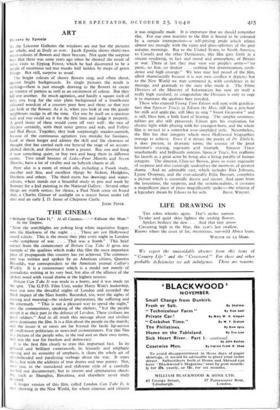THE CINEMA
"Britain Can Take It." At all Cinemas.-" Edison the Man." At the Empire.
"Now the searchlights are poking long white inquisitive fingers into the blackness of the night. . . . These are not Hollywood sound edects. This is the music they play every night in London —the symphony of war. . . . That was a bomb." This brief extract from the commentary of Britain Can Take It gives one example of the qualities which make this film the most important piece of propaganda this country has yet achieved. The commen- tary was written and spoken by an American citizen, Quentin Reynolds, war correspondent to the American journal Collier's. Weekly. It is a commentary which is a model not merely of journalistic writing at its very best, but also of the alliance of the spoken word with visual drama at the highest tension.
Britain Can Take It was made in a hurry, and it was made on the spot. The G.P.O. Film Unit, under Harry Watt's leadership, went out into the dreadful nights of London and recorded the black impact of the Nazi bombs. Recorded, too, were the sights of evening and morning—the ordered preparation, the suffering and the aftermath. ".This is not a pleasant way to spend the night," says the commentator, speaking of the shelters, "but the people accept it as their part in the defence of London. These civilians are good soldiers." And in all truth this message about our civilian army dominates the film. It is a film about the people on the march; and the issues it so raises are far beyond the facile lip-service of small-town politicians or news-reel commentators. For this film Is a picture of the people who, in the end and on their own terms, will win the war for freedom and democracy.
It is the first film clearly to state this important fact. In its pellucid and brilliant camerawork, its leisurely and emphatic cutting and its economy of emphasis, it clears the whole air of dunderheaded and paralysing verbiage about the war. It states facts, but with the addition of true drama and true poetry. Not, note you, in the considered and elaborate style of a carefully vio,-ked out documentary, but in sincere and spontaneous shoot- ing such as Shanghai, Barcelona, and elsewhere never truly inspired. .
A longer version of this film, called London Can Take It, is now showing in the New World, for whose cinemas and citizens it was originally made. It is important that we should remember this. For our own reaction to the film is bound to be coloured by a certain introspection-7-a self-pitying pride which relates almost too strongly with the ruins and glass-splinters of the grey autumn mornings. But to the United States, to South America, to-Canada and the other Dominions, this film goes forth as a sincere rendering, in fact and mood and atmosphere, of Britain at war. There at last they may view our people's army—" no panic, no fear, no despair . . . nothing but determination, confi- dence and high courage." We here may feel proud of the film, albeit shamefacedly because it is our own conflict it depicts; but to the New World we may commend it, with confidence in its message, and gratitude to the men who made it. The Films Division of the Ministry of Information has now set itself a really high standard; to congratulate the Division is only to urge it to maintain the qualities here revealed.
Those who enjoyed Young Tom Edison will note with gratifica- tion that Spencer Tracy, in Edison the Man, still has a penchant for milk and apple-pie, still likes to sing "Sweet Genevieve" and is still, bless him, a little hard of hearing. The simpler sentimen- talities are also still preserved; Edison gets his inspiration for electric light while playing with his youngest-born, and the whole film is treated in a somewhat over-simplified style. Nevertheless, the film has that integrity which most Hollywood biographies manage to achieve. Even if it misses the purity of Dr. Ehrlich, it does present, in dramatic terms, the essence of the great inventor's craving, ingenuity and triumph. Spencer Tracy unashamedly and brilliantly remains Spencer Tracy, but reaffirms his laurels as a great actor by being also a living parable of human integrity. The director, Clarence Brown, gives us every ingenuity of suspense and also cunningly underplays the moments of greatest drama. And an admirable cast, which includes Rita Johnson, Lynne Overman, and the ever-adorable Felix Bressart, completes a picture which is essentially decent and sincere. And apart from the inventions, the suspense, and the sentimentalities, it contains a magnificent piece of prose magnificently spoken—the relating of
a legendary dream by Edison to his wife. BASIL WRIGHT.


























 Previous page
Previous page